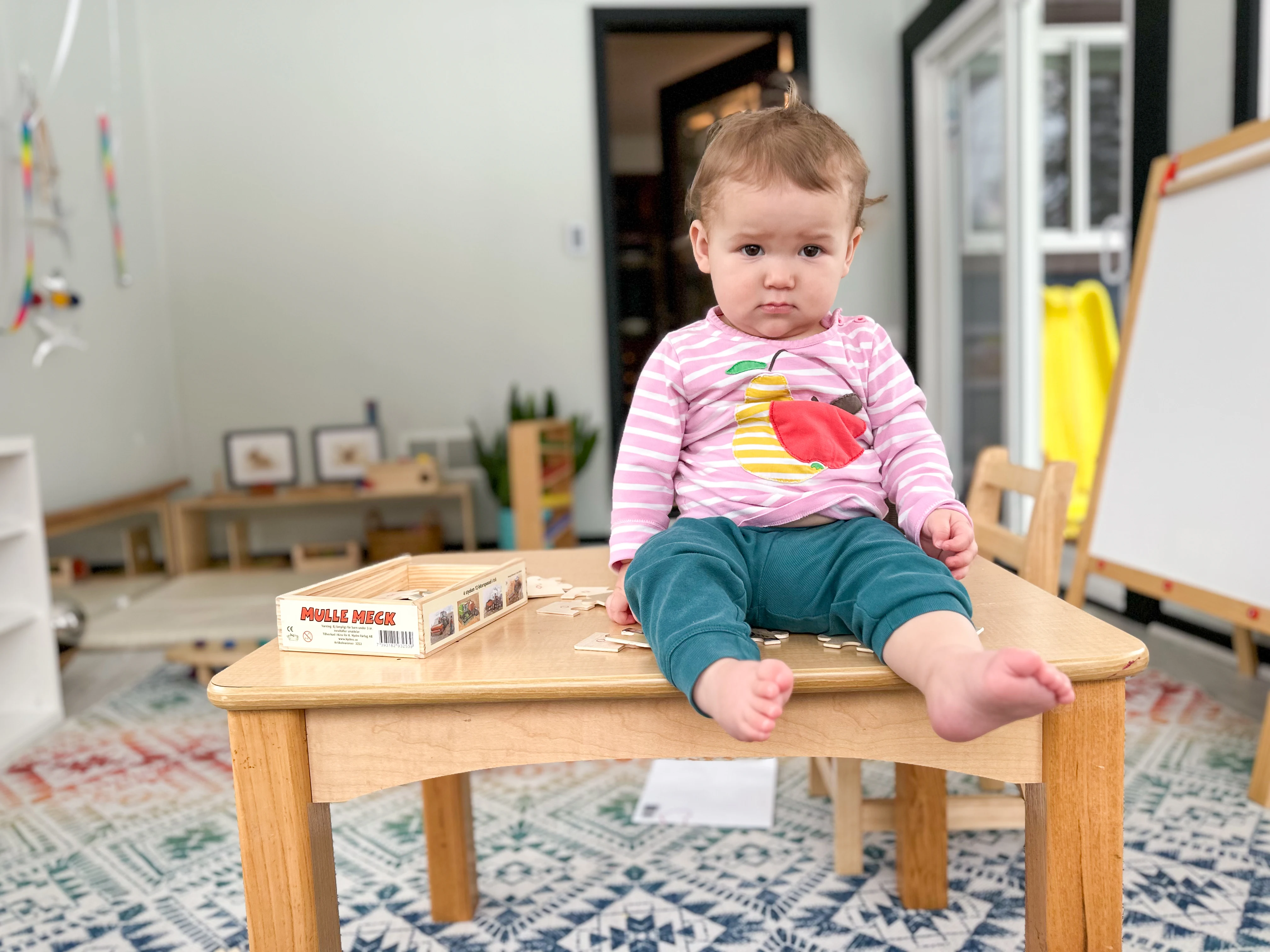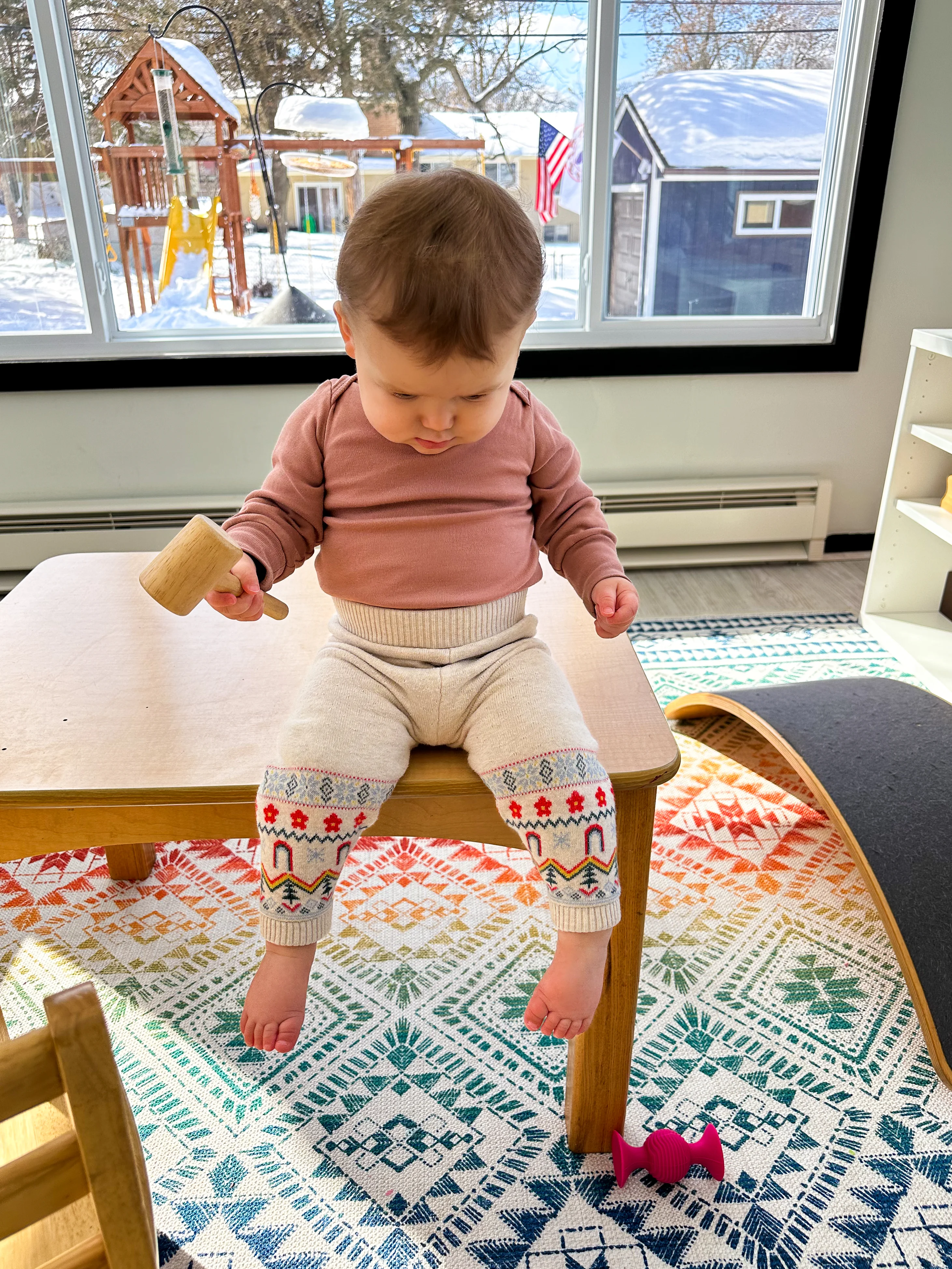If you walk into my house at any given moment there's a pretty good chance that Penelope is going to be on top of one of the children's tables. She seems to have an describable desire to climb and sit high up. As with all babies, her drive to follow her developmental path is so strong. As a Montessori parent, my job is to sit back and watch that development unfold while upholding the boundaries necessary to keep her safe.
Even in Montessori homes, babies are going to get into things that they shouldn't or can't do. As the adult we need to respond with care, understanding, and love while still upholding the boundary. That's not always easy with babies. Babies are still learning language, they don't care about your expectations, and their horme (drive to develop themselves) is mostly overpowering. So, what can we do?
Montessori Parenting Tips for Babies and Boundaries
When it comes to discipline and babies, there are a four steps that I use when it comes to setting and upholding expectations and boundaries around their exploration. They are:
Define the Boundary for Yourself
First, you need to define what your boundaries are and they need to be few and reasonable. Save your "no" for the important things. What is important to you, is going to depend on your comfort level, not mine. See the thing about Penelope climbing on the tables is that I don't care. I'm using this example of Nellie on the tables because for a lot of families, this is a deal breaker.
For me, it's not a boundary I'm interested in placing. We have to pick things that are so important that we are going to want to uphold them every time. You have to balance upholding the boundary with your baby's absolute need to explore. Don't decide in the moment, think about it, make a conscious decision to uphold it.
Observe Your Baby
Second, act based on your observations, not your initial reaction. In order to truly respond to our child's need to explore, we need to understand it. And, to understand it, we need to watch it.
Back to Penelope on the table. My observation process helped me consider that Penelope - being a natural gross motor development kid - is really stable. She's climbing on things that aren't taller than herself, and she's able to get up and down alone. In other words, I'm observing that she's safe. So, is it really worth upholding that boundary - no. But, that changes if we're talking about the much higher kitchen counter.
Enforce the Boundary Through the Environment
Third, the environment needs to be your number one way to enforce your boundary. You don't want your baby to explore something - remove it. Your baby can't access a room - block it off. We can't have something in our environment that we absolutely don't want our baby to try and explore. Their drive to understand their world is too great. So for a time, until they are older and more capable of containing their natural instincts to explore, we need Sometimes, we can also adapt our environment to make exploration possible.
For Penelope and the tables - if I didn't want her to climb, I could make the chairs inaccessible to her. That way she couldn't climb up. That would naturally remove my need to enforce her staying down. In our case, I actually choose to keep the chairs, so that she can get up and down on her own. Similarly, I add a stool to help her get up and down off the couch safely - using my environment as the guide instead of me.
Redirect with Patience
There are times when you're not going to be able to change your environment to completely adapt or eliminate the need to set a boundary with your baby. I can't remove the counters in my kitchen that Penelope wants to climb, for example. So, redirect to an appropriate activity. Don't use a lot of words, don't offer too many choices/warnings/chances. Just lovingly and gently remove and offer something they can do instead.
And, this will require patience. It will require a lot of redirections (maybe for years) as your child develops the self control to override their natural urges. But, if you're really limiting the amount that you're redirecting, and staying consistent, your child will eventually learn and respect that boundary. Stay patient, stay kind, stay calm, and stay consistent.
Upholding boundaries with older babies and young toddlers can be a little draining. But with time, you can keep your baby safe and still allow them the time and space they need to explore their world.





